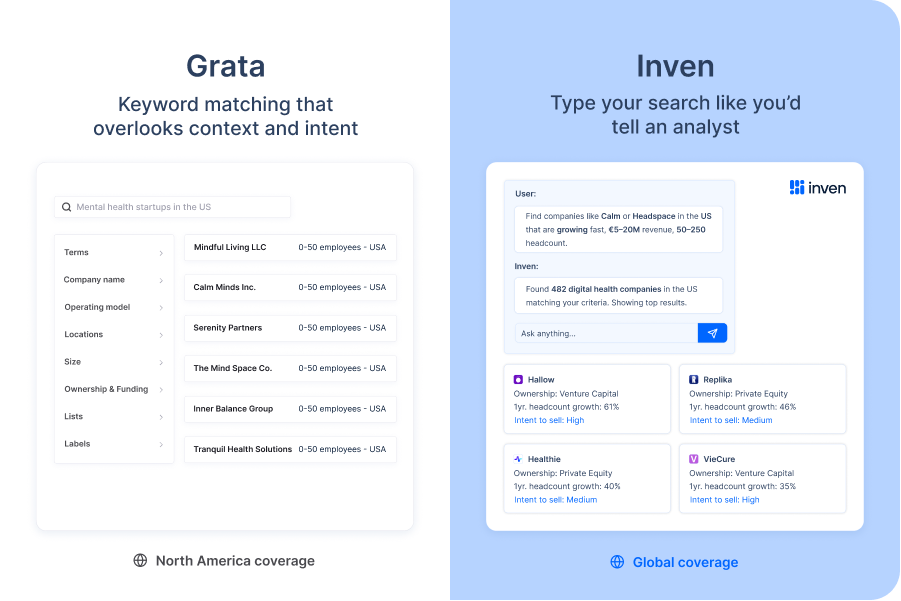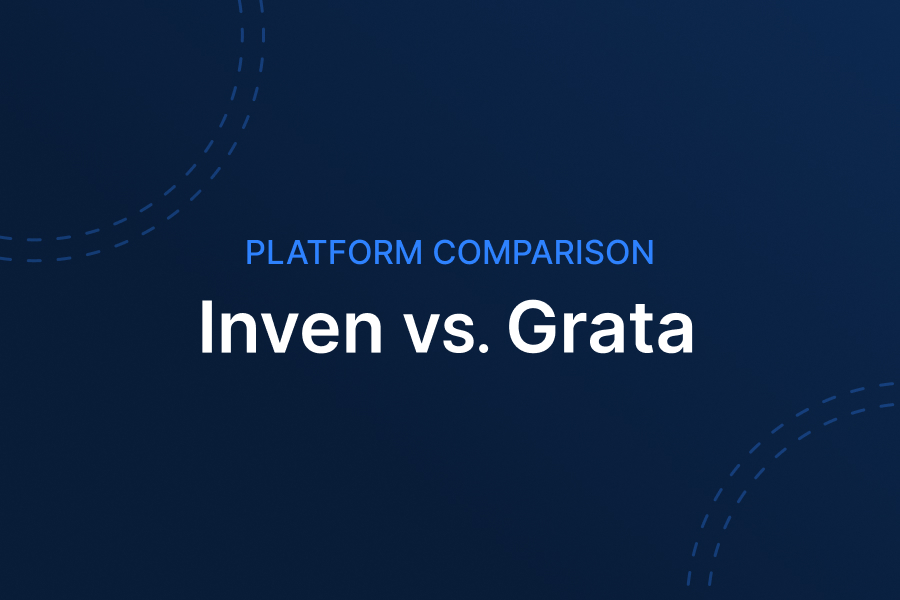Comparing Inven and Grata
Choosing the right deal sourcing platform can reshape how M&A teams uncover opportunities, particularly in the middle market. This comparison breaks down how Inven and Grata differ across features, coverage, accuracy, usability, and AI capabilities.
Key Takeaways
- Coverage: Inven tracks 21+ million companies with global coverage, while Grata stands at 19+ million. According to user reports, Grata data remains concentrated in North America.
- Accuracy: Inven’s AI-native search analyzes sources in multiple languages, surfacing niche, global targets others miss. Grata’s keyword-based model relies on user-defined filters and inputs to maintain precision.
- Contact information: Inven integrates verified executive contacts provided by data partners directly into search results, while Grata offers manual enrichment upon request when contact data is incomplete.
- Feature differences: While Inven and Grata both improve middle-market discovery through automated list building, their capabilities differ in approach. Inven offers AI enrichment of search results, a people search feature, natural language search capabilities, and the ability to identify intent-to-sell signals. Grata includes conference participation data as part of its discovery features.
- Pricing: Exact Inven and Grata pricing details aren’t publicly available. Grata’s basic annual plan is listed on Capterra at approximately $15,000. Inven offers three pricing packages designed for different team sizes, providing flexibility and a competitive price point for users with varying needs.
- User experiences: “We had both Grata and Inven. The same search in Inven brought a vast number of companies that Grata missed.”
– Private equity customer that tested both platforms - Bottom Line: Both platforms support company discovery, but Inven’s AI-driven system enables users to reach insights faster and cover niche markets in greater depth.
Want to see the difference? Book a demo to experience how leading PE, investment banking, corporate development, and venture capital teams find and win more deals with Inven’s AI-native sourcing platform.
Overview: Inven vs. Grata – Deal Sourcing Approaches Explained
Both Inven and Grata are deal sourcing platforms built to make finding private companies faster and more effective for dealmakers. The platforms allow M&A teams to identify private middle-market companies, spot live deals, build buyer lists, and get insights such as revenue estimates and ownership information.
They share the same goal: helping M&A, private equity, and corporate development teams uncover opportunities that traditional company databases often miss.
What differentiates Inven and Grata?
Grata focuses on structured data and company discovery through enrichment and industry research. Its platform combines company information with event and conference data, offering visibility into firms that are active in professional networks and supporting target discovery. Grata was built on machine learning and natural language processing in 2016.
Inven offers extensive and enriched company data, discovering ownership information, financials, and intent-to-sell indicators that help users prioritize outreach. Inven is the first global AI-native deal sourcing platform, founded in 2022. With CRM integration and AI enrichment opportunities, Inven supports global sourcing workflows from discovery to outreach. Inven is the first deal sourcing platform built to uncover the full private market globally.
Both platforms help dealmakers find and evaluate companies; Grata through a keyword-driven research workflow, and Inven through automated intelligence scaling across regions and industries.
The Inven database covers roughly two million more companies with global coverage, while Grata’s platform is reported by users to be limited mainly to the North American region.

Inven vs. Grata Pricing
Both Inven and Grata offer flexible pricing designed to meet the needs of M&A professionals, with customizable plans, packages, and add-ons.
How much does Grata cost?
Grata’s pricing is annual and varies based on the number of seats, integrations, and selected add-ons. Specific pricing information isn’t publicly listed on the company’s website. According to Capterra, Grata’s basic plan is quoted at approximately $15,000 per year.
How much does Inven cost?
Inven pricing is structured around three pricing packages designed for different team sizes and sourcing needs. Inven offers competitive pricing for smaller teams and flexible customization for enterprise partners.
“Inven is perfect in that it has surprisingly fantastic depth, a very nice AI tool to refine your searches, and the right price point. Easy to use, and customer support was always there when I needed.”
– Global Head of M&A using Inven to originate deals and access a deep database of companies, G2 Review
Feature Comparison: Inven vs. Grata
If you’re deciding which platform fits your workflow, understanding the platform capabilities and where each one excels can help you make the right call.
Here's how Inven and Grata compare across the features that matter most to deal teams.
Prefer a quick view? See the standalone Inven vs. Grata feature comparison table.
Or book a demo to see the difference.
The AI-Native Difference: Faster and Broader
AI-native platforms have a clear edge over systems built on fixed data and rigid industry codes. Instead of relying on preset categories, they learn and adapt continuously, giving deal teams a broader and more accurate view of the market.
How Does an AI-Native Deal Sourcing Platform Like Inven Differ from Grata?
Deal teams describe Inven as providing access to an unmatched range of company data sources. Inven AI structures data from company websites, official registries, reliable news sources, social signals, and data provider partners. This approach gives users a broader, continuously updated view of the private market, reducing the manual research traditionally required.
Unlike platforms built on fixed data categories and industry codes, Inven understands context. It can adapt to user inputs and market patterns to find companies that are a match, even when those businesses don’t fit standard industry codes or keywords.
“We had both Grata and Inven. The same search in Inven brought a vast number of companies that Grata missed.”
– Private Equity user, customer feeback
How Does AI Improve Deal Sourcing in Practice?
In Inven, you can easily search with natural language prompts ( “health-tech suppliers in Germany,” for example). The search returns refined, enriched lists with relevant datapoints. Profiles automatically include data such as ownership information, financial details or revenue estimates, and contact data, powered by AI enrichment rather than manual updates.
Grata centers on keyword-based discovery and structured filters. Users begin with a keyword, company, or list and get refined results through web crawling and filters. It’s effective for targeted, well-defined searches but requires more precise inputs and manual iteration to reach comparable breadth.
For dealmakers, the difference comes down to visibility:
where Grata helps you search for what you already know, Inven helps you discover what you didn’t know to look for.
Inven vs. Grata User experiences
Professionals using both Inven and Grata – from private equity analysts to investment banking partners – point to differences in coverage, accuracy, and ease of use.
The following excerpts from case studies, verified G2 reviews, and customer feedback highlight recurring themes shared by Inven users.
Accuracy and Coverage:
“There are a lot of companies that Inven has which other platforms don’t. The same search with Inven brought a vast number of companies that softwares like Grata missed.”
– Co-Founder and Managing Partner at Desert Horizon Capital, Inven Case Study
“I don’t know what the secret sauce is, but there are definitely names that showed up on Inven that didn’t show up on other deal sourcing platforms.”
– Partner and Co-Founder at Edgehill Management, Inven Case Study
“Inven is consistently accurate, clearing out companies that are out of scope and cutting search time in half.”
– Analyst using Inven to find and compare M&A targets, G2 Review
Speed and results:
“The Inven platform is fast, intuitive, and provides highly relevant results. I like that I can quickly generate lists and refine them with just a few prompts.”
– Corporate development manager using Inven to strengthen pipeline and source new opportunities, G2 Review
“The Inven AI screener stood out immediately. I could ask precise questions and refine my lists in minutes. The search screening, and quick list-building features made it the most effective platform we’d tried.”
– Investment Analyst at Imbiba, Inven Case Study
Ease of Use:
“I like that we can get a lot of leads on Inven, and I think Inven has a cleaner UI than Grata.”
– Customer feedback
“The Inven AI prompts make it feel like I’m working with a colleague rather than a database. It’s intuitive and adapts quickly to the way I search.”
– Director of Strategy using Inven to improve the quality of reviewed opportunities, G2 Review
While Grata remains well-regarded for its structured filters and event-based insights, Inven users frequently emphasize that Inven has broader reach, cleaner workflows, and faster discovery experience across industries and regions.
Future Outlook: Inven and Grata in 2025
In 2025, Inven raised a $12.75 million Series A round, led by Ventech and Vendep Capital. The funding comes at a time of rapid growth and increasing adoption across private equity, investment banking, and corporate development teams.
Inven plans to further scale its AI engineering, product development, and global data infrastructure, with the goal of becoming the default AI-native platform for sourcing private market opportunities.
Recent news and directions for Grata include being acquired by private equity-backed Datasite. With this recent 2025 acquisition, Grata’s private company data and discovery tools are expected to be integrated into Datasite’s transaction ecosystem, marking a period of transition that may reshape the platform’s future direction. As with many acquisitions, such transitions can bring changes that make future development paths less predictable.
Verdict: Comparing Two Approaches to Private Company Discovery
At the end, both platforms enhance deal sourcing effficiency. Inven takes it a step further enabling niche discovery through advanced AI.
Is Inven better than Grata for deal sourcing?
Both Inven and Grata help dealmakers identify and evaluate private companies more efficiently than manual research ever could. The difference lies in how they approach discovery.
Grata takes a structured, keyword-based path. The approach works when parameters are clear and research is centered around known industries or lists. Built on machine learning and natural language processing in 2016, Grata paved the way as an early adopter of AI techniques for company discovery.
Inven is built for niche discovery. The AI-native system interprets natural language, understands context, and structures data automatically. In practice, this offers a more intuitive search experience alongside weighted keyword options. For teams and professionals who want to search by description, example company, or selling intent, Inven offers a broader and more adaptive sourcing experience. Inven’s foundations are in second-generation AI, building on the AI evolution with newer-generation AI models adopted in 2022.
Ultimately, both platforms support modern dealmaking – one through structured search, the other through intelligent discovery.
Teams prioritizing speed, global visibility, and continuous enrichment consistently choose Inven as the platform built for the next generation of AI-driven deal sourcing.
For additional context, Inven is also recognized among leading private equity data providers in independent reviews such as SourceCoDeals’ “19 Best Private Equity Data Providers in 2025”, where it’s listed ahead of Grata for its AI-driven global coverage.
Final Takeaways: Inven vs. Grata
Inven helps dealmakers find companies others can’t – faster, globally, and with confidence. Internal benchmark testing shows that the new search model delivers a 93% accuracy on top results and up to a 97% accuracy on search queries overall.
With proprietary data on 21+ million companies, advanced AI filters, and highly rated customer support (See G2 reviews), Inven offers a smarter, more adaptive way to source opportunities.
Ready to see the difference?
Book a demo to experience how leading PE, investment banking, corporate development, and venture capital teams can accelerate their sourcing and find niche companies with Inven’s AI-native platform.








